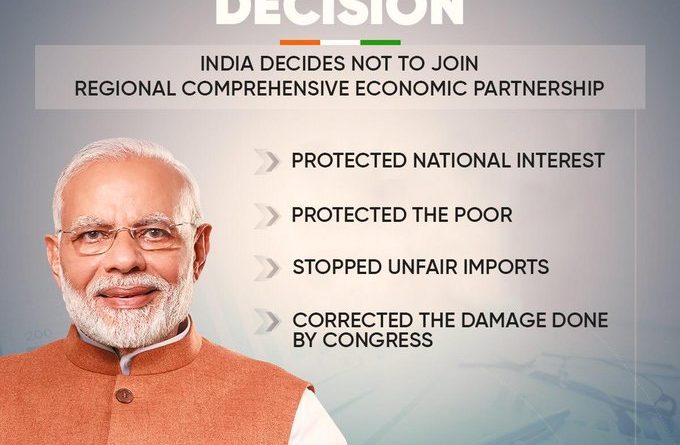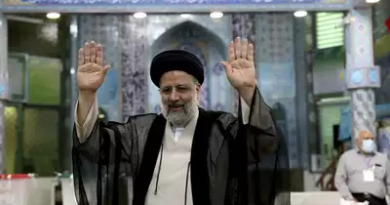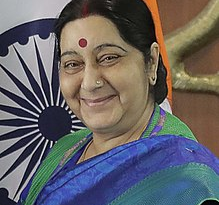INDIA Walks Out Of RCEP Saying It Will Adversely Impact Live & Livelihoods of Millions of Indians
Government of India led by Prime Minister Narendra has declined to join the China sponsored Regional Comprehensive Economic Partnership (RCEP) deal saying the RCEP in the present form will adversely affect the national interest. Most of India’s domestic industry and farmers had opposed the pact fearing it would lead to uncontrolled dumping of Chinese products.“India conveyed its decision to not join… (There are) significant issues of core interest and the impact it would have on the livelihood of vulnerable sections. India has participated in good faith in the RCEP discussions and had negotiated hard with a clear-eyed view of our interests,” said Vijay Singh Thakur, secretary (east), Ministry of External Affairs, in Bangkok. She added that not joining the pact was the right decision at the moment. Fifteen other nations, however, went ahead with the deal after the conclusion of the summit in Bangkok, which was also attended by Prime Minister Narendra Modi.“Participating countries have concluded text-based negotiations for all 20 chapters and essentially all their market access issues,” said the joint statement issued after a meeting of RCEP leaders. The deal is now being scrubbed for legal issues. Negotiations, started in 2012, will now culminate in a final deal being signed by 2020, it added.The RCEP nations have also left the door open for India — the largest untapped consumer and industrial market — in the bloc. “All RCEP countries will work together to resolve these outstanding issues in a mutually satisfactory way. India’s final decision will depend on satisfactory resolution of these issues,” the joint statement added. But Modi informed the other leaders that the deal in its current form “does not fully reflect the basic spirit and the agreed guiding principles of the RCEP”.“When we look around we see during seven years of RCEP negotiations, many things, including the global economic and trade scenarios have changed. We cannot overlook these changes,” PM Modi said Industrialists welcomed the government’s decision. The Confederation of Indian Industry (CII) had over the weekend said India needed to enter the bloc so as to not lose access to Southeast Asia. But, on Monday, it changed its opinion.“The CII appreciates government’s stance on addressing all outstanding issues before joining the RCEP. We sincerely hope issues will be resolved soon to the mutual satisfaction of all RCEP countries,” said CII President Vikram Kirloskar. The Business Standard adds “Aware of its massive trade deficit, India is preparing a final list of products on which it may retain import tariffs for China in the proposed Regional Comprehensive Economic Partnership (RCEP) agreement, said official sources. The government has been preparing such a list for a while now, based on its plan of a “differential tariff reduction”. China, which has benefited the least, has opposed this move, along with richer economies such as Australia and New Zealand.“Considering our sensitivity to imports from China, this has been the case throughout,” said a senior government official, who did not want to be named, adding: “An extensive list is being prepared.”He also said the list was unfinished and was being drawn up after extensive consultation with domestic industry. The RCEP under negotiation among the 10-nations comprising Jakarta headquartered Association of Southeast Asian Nations (Asean) and their six free-trade partners and ASEAN’s Dialogue partners -China, India, Japan, South Korea, Australia and New Zealand. Twenty-eight rounds of talks have concluded besides eight minister-level meets over about seven years.




